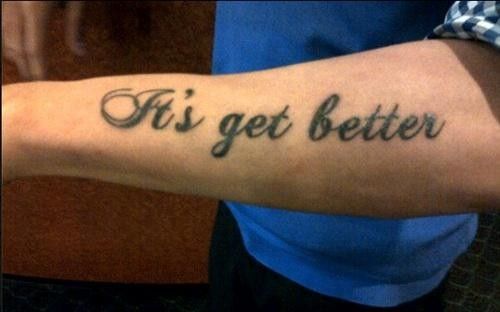Your, you're. Then, than. Your/you're thoughts?
Comments
-
i dislike you greatly.........danielzreyes:
+1. Their our people who just don't get it. To many two list but hears another common won........ lose and loose.brianetz1:the your/you're type of grammatical errors are a pet peeve of mine. My friends purposely put the wrong version in emails and texts just to *** with me.0 -
Capital "I" son.brianetz1:
i dislike you greatly.........danielzreyes:
+1. Their our people who just don't get it. To many two list but hears another common won........ lose and loose.brianetz1:the your/you're type of grammatical errors are a pet peeve of mine. My friends purposely put the wrong version in emails and texts just to *** with me.0 -
I'm for proper grammar, but dialectical writing doesn't bother me at all. I think there's a difference though. You're/your isn't dialectical, it's wrong. Gonna/going to is dialectical. Oh, and Rain...
Than is for comparing one thing to another (bigger than, fatter than, premiprempremi-er than, etc.), then is for time (I smoked a MoW then said "FTW!!!!")
And someone asked affect/effect. Generally speaking, effect is a noun (It had an effect on...) and affect is a verb (It was affected by...). The sticky wicket there is that affect an also be a noun meaning your demeanor. As positive affect is smiley, negative is frowning/scowling, and flat affect is no expression at all.0 -
Thanks! And....mind blown.Ken Light:I'm for proper grammar, but dialectical writing doesn't bother me at all. I think there's a difference though. You're/your isn't dialectical, it's wrong. Gonna/going to is dialectical. Oh, and Rain...
Than is for comparing one thing to another (bigger than, fatter than, premiprempremi-er than, etc.), then is for time (I smoked a MoW then said "FTW!!!!")
And someone asked affect/effect. Generally speaking, effect is a noun (It had an effect on...) and affect is a verb (It was affected by...). The sticky wicket there is that affect an also be a noun meaning your demeanor. As positive affect is smiley, negative is frowning/scowling, and flat affect is no expression at all.0 -
And that, my friends, is why he is a professor. That, plus he's smarter then you're average dude.Ken Light:I'm for proper grammar, but dialectical writing doesn't bother me at all. I think there's a difference though. You're/your isn't dialectical, it's wrong. Gonna/going to is dialectical. Oh, and Rain...
Than is for comparing one thing to another (bigger than, fatter than, premiprempremi-er than, etc.), then is for time (I smoked a MoW then said "FTW!!!!")
And someone asked affect/effect. Generally speaking, effect is a noun (It had an effect on...) and affect is a verb (It was affected by...). The sticky wicket there is that affect an also be a noun meaning your demeanor. As positive affect is smiley, negative is frowning/scowling, and flat affect is no expression at all.0 -
I don't care as long as I can understand it!! But I'm sure I screw it up all the time lol0
-
Mistakes happen, but type it so I can understand what you mean. I won't call anyone out ever, but man... if you're gonna type it then do it correctly.
I used both "you're" and "then" 0
0 -
ps I still get confused on split infinitives. Also, I misspelled "reverend" in our wedding bulletins. I think I left out a letter, lol!!!Martel:
I've had a couple of things published...not for any profit mind you, but in church bulletins and in newsletters/fundraising mailers for organizations and the like. I have an English teacher friend who's proofread many of those things and only made one correction. On that correction, her comment was, "my suggestion may not be any better than what you have, because I'm OCD about parallel construction, but there's no good way to make what you're trying to say parallel without splitting an infinitive, so good luck with whatever you choose. You write better than I do." I rewrote it and was able to work around the issue; it was still a little awkward.Bob Luken:
Well, What if you were choosing someone to write out a menu for your restaurant? Or picking someone to write up the church bulletin? In that case you SHOULD discriminate against known grammatical offenders. LOLMartel:If you mess up grammar in this way, I will discriminate against you. Live with it.
Now, what's the html tag for sarcasm? Is that in the 101 thread?
I tried getting a job teaching composition, but didn't have enough graduate credits in that specific field. But I write better than the English teacher who does have those credits...oh well.0 -
-
 0
0 -
 0
0 -
 0
0 -
 0
0 -
Oh My God! No.0
-
Misspelled tattoos are the worst. They're really cringe worthy.
Another one that perturbs me is the misuse or confusion in usage between "less" and "fewer".0 -
I've been told that this one is somewhat arbitrary and there is no grammatical rule on it. Not sure if that's true. At the very least there are many gray areas for which to use when. Generally I believe it's if you can count it, it's fewer (fewer mistakes), if it's a measure of magnitude, it's less (less terrible).Martel:Misspelled tattoos are the worst. They're really cringe worthy.
Another one that perturbs me is the misuse or confusion in usage between "less" and "fewer".0

